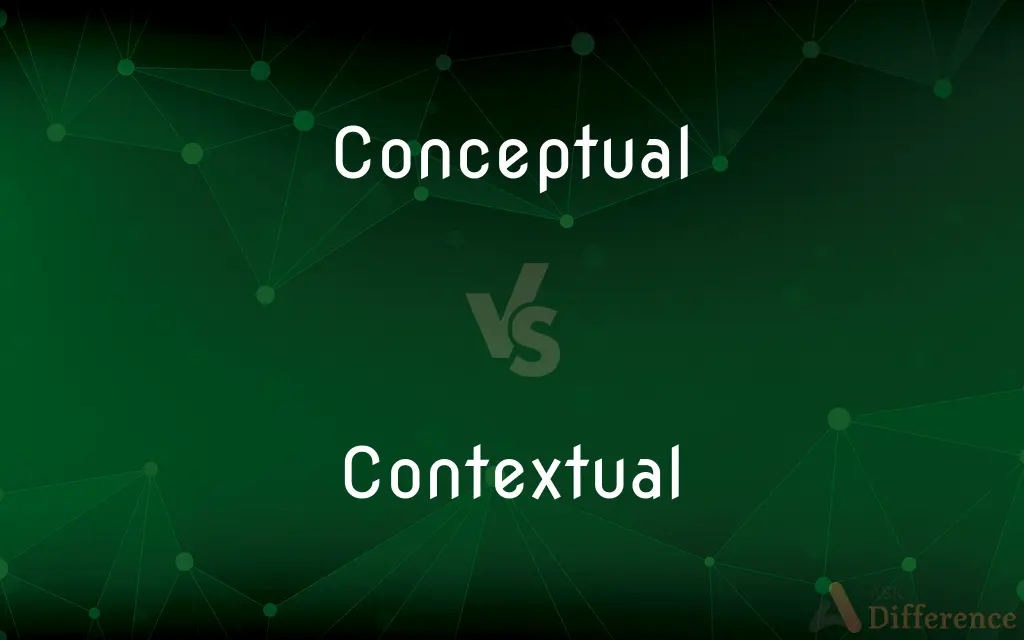Conceptual vs. Contextual — What's the Difference?
By Urooj Arif & Maham Liaqat — Updated on April 1, 2024
Conceptual refers to ideas or theories, while contextual relates to specific circumstances or settings.

Difference Between Conceptual and Contextual
Table of Contents
ADVERTISEMENT
Key Differences
Conceptual thinking involves abstract ideas, principles, or theories that are not tied to specific instances. It's about understanding the general framework or concept behind phenomena. Contextual thinking, on the other hand, focuses on the specific circumstances, background, or environment that surrounds an event or idea, emphasizing how context influences meaning and understanding.
While conceptual knowledge provides a broad understanding and enables the application of principles across different situations, contextual knowledge is crucial for understanding the nuances and specifics of a particular situation or case. For instance, a conceptual understanding of democracy outlines its principles and workings, whereas a contextual analysis might examine how democracy functions in a specific country at a particular time.
The development of conceptual frameworks can guide research, analysis, and understanding across various fields, offering a generalized perspective that transcends specific cases. Conversely, contextual analysis is key in fields like history, sociology, and anthropology, where the particularities of a situation significantly impact outcomes and interpretations.
In education, conceptual learning focuses on teaching students the underlying principles and theories that can be applied across different contexts. Contextual learning, meanwhile, involves relating educational content to real-world situations, making learning more relevant and engaging for students.
Conceptual understanding aids in creating models, theories, and systems by abstracting from the details, allowing for generalization and prediction. Contextual understanding, however, enriches this by providing depth, situational awareness, and specificity, which are essential for practical application and comprehensive analysis.
ADVERTISEMENT
Comparison Chart
Definition
Relating to ideas or theories
Relating to specific circumstances or settings
Focus
General principles and frameworks
Specific nuances and environments
Application
Broad, across various situations
Specific to particular cases
Importance
Enables generalization and theory development
Provides depth and situational awareness
In Education
Teaches underlying principles
Relates content to real-world situations
Compare with Definitions
Conceptual
General principles.
Conceptual learning in mathematics involves understanding the theory behind formulas.
Contextual
Influenced by environment.
Contextual advertising targets ads based on the user's browsing history.
Conceptual
Ideas or theories.
Conceptual art focuses on the idea behind the work rather than its aesthetic.
Contextual
Relevant to particular cases.
Contextual analysis in literature examines the influence of the author's background.
Conceptual
Framework for understanding.
The conceptual framework of social justice guides research across disciplines.
Contextual
Specific circumstances.
Contextual factors significantly impact the outcome of political elections.
Conceptual
Abstract thinking.
Conceptual discussions often involve abstract thinking about potential scenarios.
Contextual
Nuanced understanding.
A contextual study of historical events considers the era's social and economic conditions.
Conceptual
Broad application.
A conceptual understanding of physics applies to various real-world phenomena.
Contextual
Real-world situations.
Contextual learning connects classroom lessons to real-life applications.
Conceptual
Relating to or based on mental concepts
Philosophy deals with conceptual difficulties
Contextual
Of, involving, or depending on a context.
Conceptual
Of or relating to concepts or mental conception
Conceptual discussions that antedated development of the new product.
Contextual
Of, pertaining to, or depending on the context of information; relating to the situation or location in which the information was found.
Conceptual
Of or relating to conceptualism.
Contextual
Relating to or determined by or in context;
Contextual information
Conceptual
Of, or relating to concepts or mental conception.
We defined a conceptual model before designing the real thing.
Conceptual
Of or relating to conceptualism.
Conceptual
Pertaining to conception.
Conceptual
Being or characterized by concepts or their formation;
Conceptual discussions
The schizophrenic loses ability to abstract or do conceptual thinking
Common Curiosities
What does contextual mean?
Contextual pertains to the specific circumstances, settings, or backgrounds that influence the interpretation or understanding of an event or idea.
What does conceptual mean?
Conceptual relates to the general ideas, theories, or principles behind something, focusing on abstract understanding.
Can something be both conceptual and contextual?
Yes, many studies or analyses combine both conceptual frameworks and contextual specifics to provide comprehensive insights.
Why is contextual understanding important?
Contextual understanding is essential for grasping the nuances of specific cases and how external factors influence outcomes.
Why is conceptual thinking important?
Conceptual thinking is crucial for developing a broad understanding, creating theories, and applying principles across different situations.
How do educators incorporate conceptual and contextual learning?
Educators often blend conceptual theories with contextual examples to enhance understanding and engagement.
Can the lack of contextual understanding undermine a conceptual approach?
Yes, without contextual understanding, a conceptual approach might not fully account for real-world complexities.
What role does context play in contextual analysis?
In contextual analysis, the context provides crucial background that shapes the meaning and implications of an event or idea.
Is one more important than the other in decision-making?
Both are important; conceptual thinking helps in strategizing, while contextual understanding aids in fine-tuning decisions to specific circumstances.
How does conceptual learning differ from contextual learning?
Conceptual learning focuses on general principles and theories, while contextual learning ties educational content to real-world situations.
How do conceptual skills differ from contextual skills?
Conceptual skills involve abstract thinking and understanding broad principles, whereas contextual skills focus on applying knowledge in specific situations.
Can a conceptual framework be applied to any situation?
While conceptual frameworks provide a general guide, their application may need to be adapted based on the specific context.
What is the value of contextual information in research?
Contextual information adds depth and specificity, making research findings more relevant and applicable to real-world situations.
How does one develop contextual understanding?
Contextual understanding is developed through experience, research, and engaging with specific situations or case studies.
How do professionals use conceptual and contextual knowledge?
Professionals use conceptual knowledge for strategy and theory, and contextual knowledge for practical application and problem-solving.
Share Your Discovery

Previous Comparison
Intramural vs. Intermural
Next Comparison
Dangri vs. DungareeAuthor Spotlight
Written by
Urooj ArifUrooj is a skilled content writer at Ask Difference, known for her exceptional ability to simplify complex topics into engaging and informative content. With a passion for research and a flair for clear, concise writing, she consistently delivers articles that resonate with our diverse audience.
Co-written by
Maham Liaqat














































